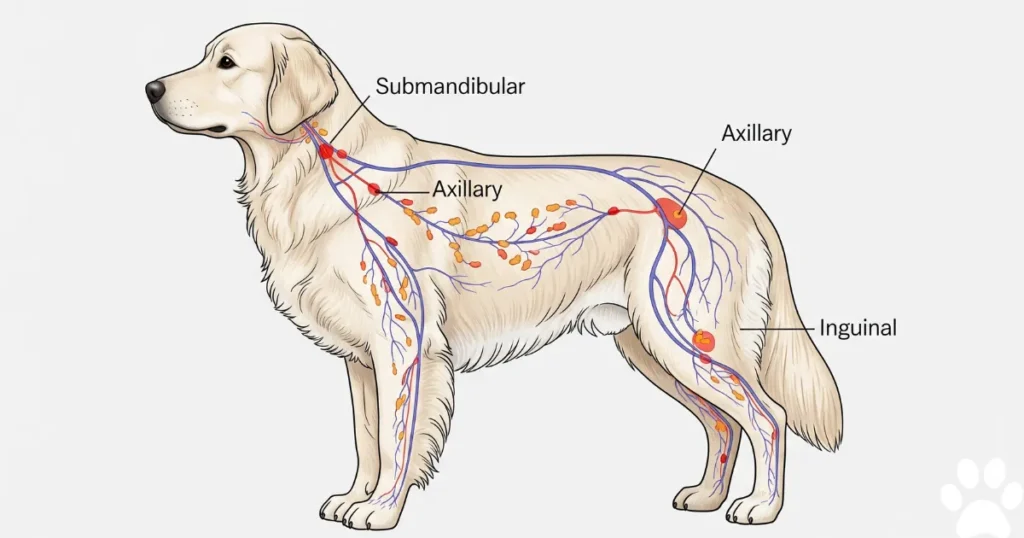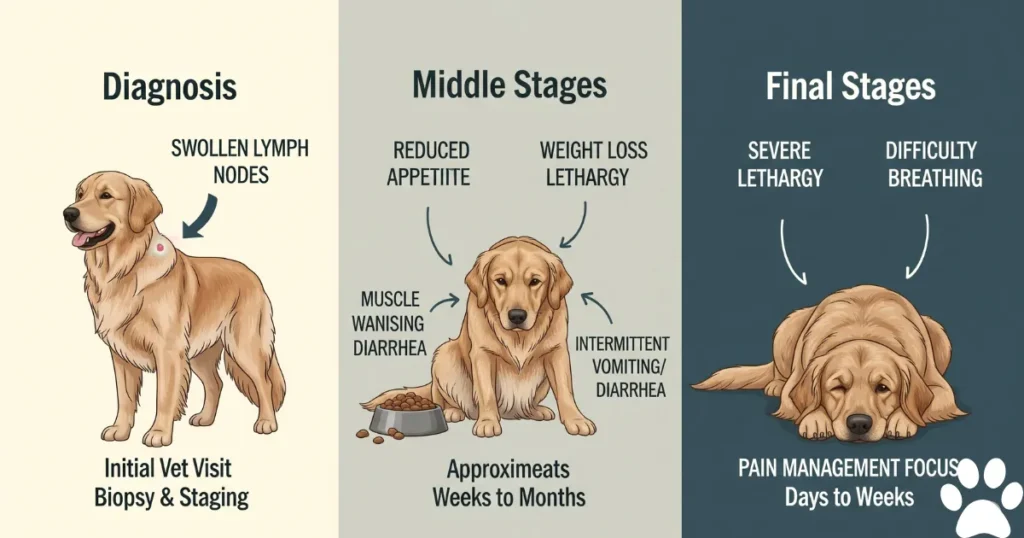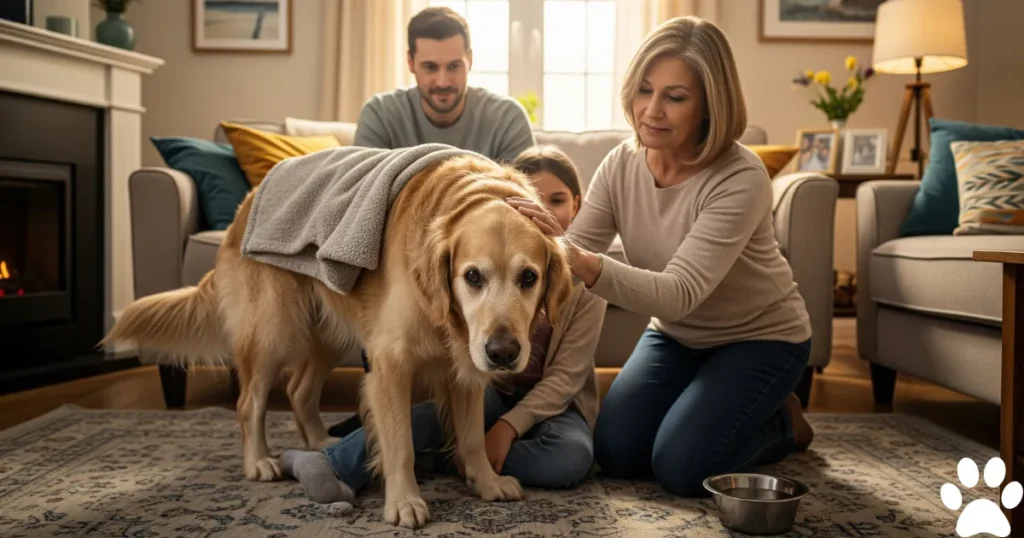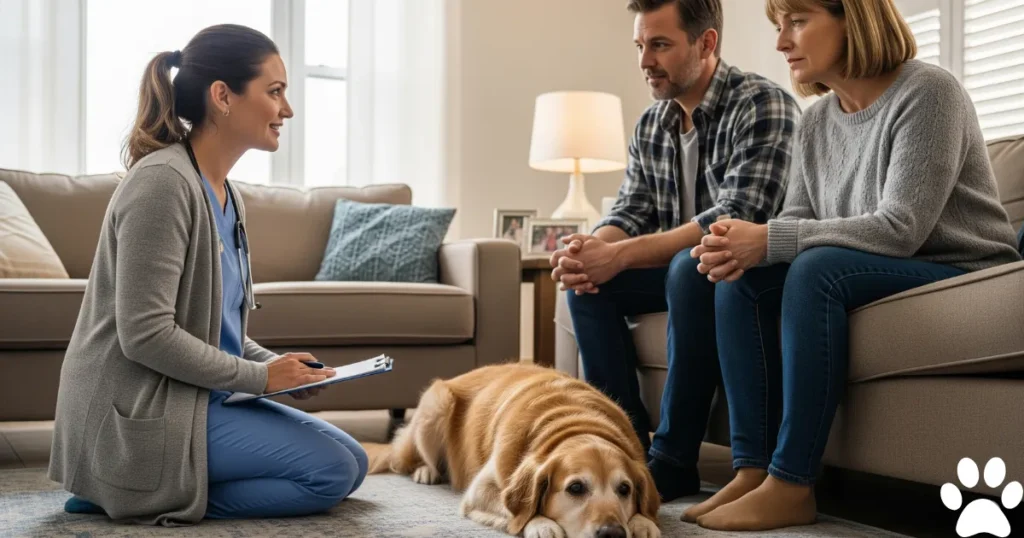The heartbreaking question “Will a dog with lymphoma die naturally?” weighs heavily on the minds of Golden Retriever owners facing this devastating diagnosis. Understanding the symptoms of final stages of canine lymphoma helps families make informed decisions about their beloved companion’s care during one of the most difficult times in pet ownership. Golden Retrievers face higher lymphoma risks than many other breeds, making knowledge about this disease’s progression essential for providing the best possible end-of-life care.
This comprehensive guide explores the natural progression of lymphoma in Golden Retrievers, helping owners understand what to expect during the final stages and how to ensure their dog’s comfort and dignity throughout this challenging journey. While the topic is undeniably difficult, having accurate information empowers families to make decisions aligned with their values and their dog’s best interests.
Contents
- 1 Understanding Lymphoma in Golden Retrievers
- 2 Natural Progression Without Treatment
- 3 Symptoms of Final Stages of Canine Lymphoma
- 4 Quality of Life Considerations
- 5 Treatment Options and Their Impact on Natural Progression
- 6 Making End-of-Life Decisions
- 7 Supporting Your Golden Retriever Through Final Stages
- 8 Understanding the Dying Process
- 9 Grief and Family Support
- 10 Prevention and Early Detection for Future Dogs
- 10.1 Will a dog with lymphoma die naturally without treatment?
- 10.2 What are the symptoms of final stages of canine lymphoma?
- 10.3 How long can a Golden Retriever live with untreated lymphoma?
- 10.4 Is it better to treat lymphoma or let a dog die naturally?
- 10.5 What does the natural dying process look like for dogs with lymphoma?
- 10.6 Can Golden Retrievers with lymphoma experience remission without treatment?
- 10.7 How do I know when it’s time to consider euthanasia for lymphoma?
- 10.8 What comfort measures can help Golden Retrievers with end-stage lymphoma?
- 11 Final Thoughts
Understanding Lymphoma in Golden Retrievers
Lymphoma represents one of the most common cancers affecting Golden Retrievers, accounting for approximately 15-20% of all canine cancer symptoms in this breed. This cancer affects the lymphatic system, which plays a crucial role in immune function and fluid balance throughout the body. Golden Retrievers develop lymphoma at rates significantly higher than most other breeds, with genetic factors contributing to this increased susceptibility.
The question of will a dog with lymphoma die naturally depends on numerous factors, including the specific lymphoma type, stage at diagnosis, treatment approach chosen, and individual dog characteristics. Without treatment, most Golden Retrievers with lymphoma will succumb to the disease within 4-8 weeks of diagnosis. However, with appropriate treatment, many dogs achieve significant remission periods and can live months to years with a good quality of life.
Lymphoma in Golden Retrievers typically develops in middle-aged to senior dogs, with most diagnoses occurring between ages 6-10 years. The disease can affect lymph nodes throughout the body, as well as organs like the spleen, liver, and bone marrow. Understanding how lymphoma progresses helps owners recognize symptoms of final stages of canine lymphoma and prepare for difficult decisions about their dog’s care.
The most common form affecting Golden Retrievers is multicentric lymphoma, which involves multiple lymph node groups throughout the body. This form typically presents with enlarged lymph nodes that owners can feel as firm lumps under their dog’s jaw, in the armpits, or around the groin area. These swollen lymph nodes represent classic signs of cancer in dogs that prompt many owners to seek veterinary evaluation initially.

Natural Progression Without Treatment
Understanding will a dog with lymphoma die naturally requires examining what happens when owners choose not to pursue aggressive treatment options. Without intervention, lymphoma follows a relatively predictable progression that varies somewhat between individual Golden Retrievers but generally involves several distinct phases leading to eventual death.
The initial phase typically involves continued enlargement of lymph nodes throughout the body, often accompanied by gradual development of systemic symptoms. Golden Retrievers may begin showing decreased appetite, mild lethargy, and subtle behavioral changes during this early progression period. These dog cancer symptoms often develop gradually over days to weeks, making them easy to attribute to normal aging or minor illness initially.
As lymphoma progresses naturally, Golden Retrievers typically develop more obvious canine cancer symptoms, including significant weight loss, increased thirst and urination, and decreased activity levels. The enlarged lymph nodes may become uncomfortable or interfere with normal body functions, particularly if they develop in locations that affect swallowing, breathing, or circulation.
The symptoms of final stages of canine lymphoma without treatment typically include severe weakness, inability to maintain normal body weight despite eating, difficulty breathing if chest lymph nodes become significantly enlarged, and eventual organ failure as the cancer overwhelms the body’s systems. This natural progression usually occurs over 1-2 months from initial diagnosis, though some dogs may decline more rapidly, while others maintain a reasonable quality of life slightly longer.
During the natural progression, Golden Retrievers may experience periods where they seem to improve temporarily, followed by a more significant decline. These fluctuations can create emotional challenges for families hoping their dog might be recovering naturally, when in reality, these temporary improvements represent normal variations in disease progression rather than actual improvement.

Symptoms of Final Stages of Canine Lymphoma
Recognizing symptoms of final stages of canine lymphoma helps Golden Retriever owners understand when their dog’s condition is deteriorating and end-of-life decisions may need consideration. These final-stage symptoms typically develop over days to weeks and represent the body’s inability to cope with the cancer’s overwhelming presence throughout multiple organ systems.
Severe weakness and lethargy characterize the symptoms of final stages of canine lymphoma, with Golden Retrievers showing dramatic decreases in energy and interest in previously enjoyed activities. Dogs may spend most of their time sleeping or lying down, showing reluctance to walk even short distances or engage in normal social interactions with family members. This profound fatigue reflects the body’s struggle to maintain basic functions while fighting widespread cancer.
Appetite loss becomes severe during the final lymphoma stages, with Golden Retrievers showing little to no interest in food or treats that previously excited them. What does cancer look like on a dog in terms of physical appearance during final stages often includes dramatic weight loss that becomes obvious even to casual observers. The combination of poor appetite and increased metabolic demands from fighting cancer creates a wasting syndrome that significantly impacts appearance and strength.
Respiratory symptoms frequently develop as symptoms of final stages of canine lymphoma, particularly when chest lymph nodes become significantly enlarged and interfere with normal lung function. Golden Retrievers may show increased breathing rate, shallow breathing patterns, or difficulty breathing, especially during any physical activity. Some dogs develop persistent coughing that doesn’t respond to typical treatments.
Gastrointestinal symptoms, including vomiting, diarrhea, or complete loss of appetite, represent common symptoms of final stages of canine lymphoma as the cancer affects digestive system function. These symptoms can lead to dehydration and electrolyte imbalances that further compromise the dog’s overall condition and comfort level.
Quality of Life Considerations
The question of will a dog with lymphoma die naturally often connects to concerns about quality of life during the disease’s final stages. Golden Retriever owners must evaluate their dog’s daily experiences to determine whether natural progression allows for acceptable comfort and dignity, or whether intervention might be more humane.
Assessing quality of life involves considering multiple factors, including appetite, mobility, social interaction, comfort level, and overall apparent happiness or contentment. Golden Retrievers experiencing symptoms of final stages of canine lymphoma may have good days mixed with increasingly frequent difficult days, making quality assessment challenging but crucial for making appropriate care decisions.
Pain management becomes increasingly important as lymphoma progresses. However, this cancer doesn’t typically cause severe pain in the same way that bone cancers like the final stages of osteosarcoma in dogs might. However, enlarged lymph nodes can create discomfort, and organ involvement may cause various types of discomfort that benefit from appropriate pain control measures.
Maintaining normal routines and activities within the dog’s capabilities helps preserve quality of life during lymphoma progression. Golden Retrievers may still enjoy gentle walks, car rides, or simply spending time with family members, even as their physical capabilities decline. Adapting activities to match current abilities rather than eliminating them helps preserve emotional well-being.
Social interaction patterns often change during the final lymphoma stages, with some Golden Retrievers becoming more clingy and seeking extra attention, while others may prefer quiet solitude. Respecting individual preferences while ensuring dogs don’t feel abandoned or isolated requires careful observation and flexible approaches to providing comfort and companionship.

Treatment Options and Their Impact on Natural Progression
Understanding will a dog with lymphoma die naturally requires considering how various treatment approaches might alter disease progression and extend life with acceptable quality. Treatment decisions significantly impact both survival time and the nature of symptoms Golden Retrievers experience during their remaining time.
Chemotherapy represents the most effective treatment for lymphoma in Golden Retrievers, with remission rates of 80-90% achievable with appropriate protocols. However, remission doesn’t mean a cure, and most dogs eventually experience disease recurrence. Understanding these realities helps owners make informed decisions about whether aggressive treatment aligns with their goals and their dog’s best interests.
The symptoms of final stages of canine lymphoma in treated dogs may differ from those in untreated dogs, as treatment can extend survival time and potentially change the pattern of disease progression. Dogs receiving chemotherapy may experience treatment-related side effects that need management alongside cancer symptoms.
Palliative care approaches focus on symptom management and comfort rather than attempting to eliminate cancer. These treatments may include medications to reduce lymph node swelling, pain control measures, appetite stimulants, and supportive care to maintain hydration and nutrition. Palliative approaches can significantly improve quality of life without the intensity of chemotherapy protocols.
Alternative and complementary therapies, including acupuncture, herbal supplements, and specialized diets, may provide additional comfort measures for Golden Retrievers with lymphoma. While these approaches rarely alter disease progression significantly, they may help manage symptoms and improve quality of life when used alongside conventional treatments.
Making End-of-Life Decisions
The reality that will a dog with lymphoma die naturally, eventually becomes yes for all affected Golden Retrievers, making end-of-life planning an essential consideration for loving families. These decisions rank among the most difficult aspects of pet ownership, requiring careful consideration of multiple factors, including the dog’s comfort, family values, and practical considerations.
Timing decisions about euthanasia versus allowing natural death involves assessing the current quality of life and anticipated changes in the near future. The symptoms of final stages of canine lymphoma can progress rapidly, making it important to have discussions about preferences and plans before crises develop.
Many veterinarians recommend considering euthanasia when a dog’s bad days consistently outnumber good days, or when basic life functions become severely compromised. However, individual families may have different values and preferences that influence these deeply personal decisions.
Home euthanasia services allow Golden Retrievers to spend their final moments in familiar, comfortable surroundings with their loved ones. This option eliminates stress associated with veterinary clinic visits and provides a more peaceful environment for final goodbyes.
Some families choose to allow natural death at home with appropriate supportive care and pain management. This approach requires careful monitoring and access to emergency veterinary care if suffering becomes apparent. Understanding what natural death from lymphoma typically involves helps families prepare for this experience if they choose this path.

Supporting Your Golden Retriever Through Final Stages
Caring for a Golden Retriever experiencing symptoms of final stages of canine lymphoma requires patience, flexibility, and commitment to maintaining comfort and dignity throughout the process. Practical care measures can significantly impact quality of life during this challenging time.
Nutritional support becomes crucial as appetite decreases and weight loss accelerates during the final lymphoma stages. Offering highly palatable foods, warming meals to enhance aroma, and providing smaller, more frequent meals may help maintain some food intake. Nutritional supplements or appetite stimulants prescribed by veterinarians can provide additional support.
Comfort measures, including soft bedding, temperature regulation, and gentle grooming, help maintain dignity and physical comfort as the disease progresses. Golden Retrievers may appreciate extra blankets if they feel cold due to weight loss, or cooling measures if fever develops from the cancer or secondary infections.
Emotional support involves maintaining normal interaction patterns while respecting the dog’s changing energy levels and preferences. Many Golden Retrievers continue to enjoy gentle petting, quiet conversation, and simply being near their family members, even when they lack energy for active play or exercise.
Monitoring for signs of distress or discomfort helps ensure appropriate interventions when needed. Changes in breathing patterns, restlessness, vocalization, or other indicators of distress should prompt communication with veterinary teams about additional comfort measures.

Understanding the Dying Process
For families choosing to allow their Golden Retriever with lymphoma to die naturally, understanding the typical dying process helps prepare for what may occur during the final days or hours. This knowledge can reduce anxiety and help families recognize when death is approaching.
The natural dying process from lymphoma typically involves a gradual decline over days to weeks, though some dogs may experience more rapid changes. Golden Retrievers often show decreased awareness of surroundings, reduced responsiveness to family members, and decreased interest in food and water as death approaches.
Physical changes during the dying process may include changes in breathing patterns, body temperature regulation, and muscle control. Some dogs experience episodes of restlessness or disorientation, while others become increasingly quiet and still. Understanding that these changes represent normal parts of the dying process can help families remain calm and provide appropriate comfort.
The final hours before death often involve very quiet, peaceful periods with minimal awareness or response. Golden Retrievers may experience irregular breathing patterns or long pauses between breaths. Family members can provide comfort through gentle touch, quiet conversation, and simply being present during these final moments.
After death occurs, families need to understand their options for handling their Golden Retriever’s remains. Veterinary offices can guide cremation services, burial options, and memorial keepsakes that help families honor their dog’s memory appropriately.
Grief and Family Support
The loss of a Golden Retriever to lymphoma creates profound grief that affects all family members, often in different ways and timelines. Understanding that grief is a normal, necessary process helps families navigate the emotional challenges associated with losing a beloved companion to cancer.
Children may struggle particularly with understanding why their Golden Retriever had to die and may need age-appropriate explanations about cancer and death. Involving children in end-of-life care decisions and memorial activities can help them process their grief and maintain positive memories of their pet.
Adult family members may experience guilt about decisions made during their dog’s illness, questioning whether they chose appropriate treatments or made end-of-life decisions at the right time. Professional counseling or pet loss support groups can provide valuable assistance in working through these complex emotions.
Creating memorial tributes, including photo albums, memory books, or special memorial services, helps families honor their Golden Retriever’s life and begin the healing process. Many families find comfort in donating to cancer research organizations or volunteering with animal welfare groups as ways to honor their pet’s memory.
Support from other Golden Retriever owners who have experienced similar losses provides a valuable perspective and understanding during the grief process. Online communities, breed clubs, and veterinary support groups often offer resources for families dealing with pet loss due to cancer.

Prevention and Early Detection for Future Dogs
While the immediate concern centers on will a dog with lymphoma die naturally, for currently affected Golden Retrievers, families may also consider prevention and early detection strategies for future dogs they might welcome into their homes.
Understanding genetic factors that contribute to lymphoma risk in Golden Retrievers helps inform decisions about choosing future dogs. Working with breeders who conduct health screening and maintain detailed health records of their breeding lines may help reduce future cancer risks.
Environmental factors, including exposure to pesticides, herbicides, and other chemicals, may contribute to lymphoma development in genetically susceptible dogs. Minimizing exposure to these substances represents one potential prevention strategy for Golden Retriever owners.
Regular veterinary care and early detection of signs of cancer in dogs provide the best opportunities for successful treatment outcomes if cancer develops. Monthly physical examinations by owners, combined with regular professional veterinary care, maximize early detection capabilities.
Will a dog with lymphoma die naturally without treatment?
Yes, will a dog with lymphoma die naturally without treatment is unfortunately inevitable, typically within 4-8 weeks of diagnosis. The disease progresses rapidly as cancer cells overwhelm the lymphatic system and spread throughout the body. However, the timeline varies between individual Golden Retrievers, with some declining more quickly while others may maintain a reasonable quality of life slightly longer.
What are the symptoms of final stages of canine lymphoma?
Symptoms of final stages of canine lymphoma include severe weakness, complete loss of appetite, dramatic weight loss, difficulty breathing, persistent lethargy, and decreased responsiveness to family members. Golden Retrievers may also experience vomiting, diarrhea, increased thirst, and swollen lymph nodes throughout their body. These symptoms typically develop over days to weeks before death occurs naturally.
How long can a Golden Retriever live with untreated lymphoma?
Golden Retrievers with untreated lymphoma typically survive 1-2 months from diagnosis, though individual variation exists. The symptoms of final stages of canine lymphoma usually develop within 4-8 weeks, leading to death from organ failure or overwhelming cancer burden. Some dogs decline more rapidly within 2-3 weeks, while others may maintain an acceptable quality of life for up to 3 months.
Is it better to treat lymphoma or let a dog die naturally?
This deeply personal decision depends on factors including the dog’s age, overall health, family values, and financial considerations. Treatment can extend survival time significantly and often maintains good quality of life for months to years. However, some families choose natural progression to avoid treatment stress and costs. Discussing options with veterinary oncologists helps inform these difficult decisions.
What does the natural dying process look like for dogs with lymphoma?
The natural dying process typically involves a gradual decline over days to weeks, with Golden Retrievers showing decreased appetite, severe weakness, and eventual organ failure. Final stages may include changes in breathing patterns, decreased awareness, and minimal responsiveness. Many dogs experience relatively peaceful deaths, though some may show signs of discomfort requiring pain management.
Can Golden Retrievers with lymphoma experience remission without treatment?
Spontaneous remission in lymphoma is extremely rare, occurring in less than 1% of cases. Will a dog with lymphoma die naturally remains yes, even in rare remission cases, as the disease typically returns more aggressively. Any apparent improvement without treatment likely represents temporary fluctuations rather than true remission, and veterinary evaluation is essential to assess the dog’s actual condition.
How do I know when it’s time to consider euthanasia for lymphoma?
Consider euthanasia when symptoms of final stages of canine lymphoma significantly impact quality of life, when bad days consistently outnumber good days, or when basic life functions become severely compromised. Signs include inability to eat, difficulty breathing, severe weakness preventing normal movement, or apparent suffering that doesn’t respond to comfort measures. Veterinary guidance helps assess the quality of life objectively.
What comfort measures can help Golden Retrievers with end-stage lymphoma?
Comfort measures include pain management medications, appetite stimulants, soft bedding, temperature regulation, gentle grooming, and maintaining familiar routines within the dog’s capabilities. Offering highly palatable foods, providing quiet companionship, and ensuring easy access to water and comfortable resting areas help maintain dignity during the final stages. Veterinary teams can prescribe additional comfort medications as needed.
Final Thoughts
The difficult question of will a dog with lymphoma die naturally, unfortunately, has a definitive answer for Golden Retriever families facing this heartbreaking diagnosis. Without treatment, lymphoma follows a relatively predictable progression leading to death within 4-8 weeks. However, understanding symptoms of final stages of canine lymphoma helps families provide appropriate care and make informed decisions about their beloved companion’s final chapter.
While the reality of lymphoma’s fatal nature can not be changed, the knowledge you’ve gained about disease progression, comfort measures, and end-of-life care options empowers you to ensure your Golden Retriever’s remaining time is filled with dignity, comfort, and love. Whether you choose aggressive treatment to extend life or focus on palliative care for natural progression, your dedication to your dog’s wellbeing during this challenging time demonstrates the deep bond you share.
Understanding symptoms of final stages of canine lymphoma helps remove some of the fear and uncertainty surrounding this disease’s progression. By recognizing what changes to expect, you can better prepare to provide appropriate supportive care and make timely decisions about pain management, quality of life assessment, and end-of-life planning. This knowledge, while difficult to confront, serves as a gift to your Golden Retriever by ensuring their final days are managed with informed compassion.
The grief associated with losing a Golden Retriever to lymphoma is profound and lasting, reflecting the depth of love shared between dogs and their families. Taking comfort in knowing that you provided excellent care, made difficult decisions from a place of love, and honored your dog’s dignity throughout their final journey can help with the healing process. Many families find that their experience with lymphoma, while devastating, ultimately strengthens their appreciation for the precious time shared with their canine companions.
Remember that each Golden Retriever’s journey with lymphoma is unique, and what you’ve learned here represents general patterns rather than exact predictions for individual dogs. Maintaining close communication with your veterinary team, trusting your instincts about your dog’s comfort and quality of life, and focusing on creating meaningful final memories will guide you through this difficult time with grace and love.
Dr. Nabeel A.
Hi, I’m Dr. Nabeel Akram – a farm management professional by trade and a passionate Golden Retriever enthusiast at heart. With years of experience in animal science and livestock care, I’ve built a career around understanding animals—how they live, thrive, and bring value to our lives. This blog is a personal project born from that same passion, focusing on one of the most loyal and lovable breeds out there: the Golden Retriever. Whether I’m managing farm operations or sharing insights on canine health, behavior, and care, it all ties back to one core belief—animals deserve thoughtful, informed, and compassionate attention. Welcome to a space where professional expertise meets genuine love for dogs.
Facebook |


Links will be automatically removed from comments.